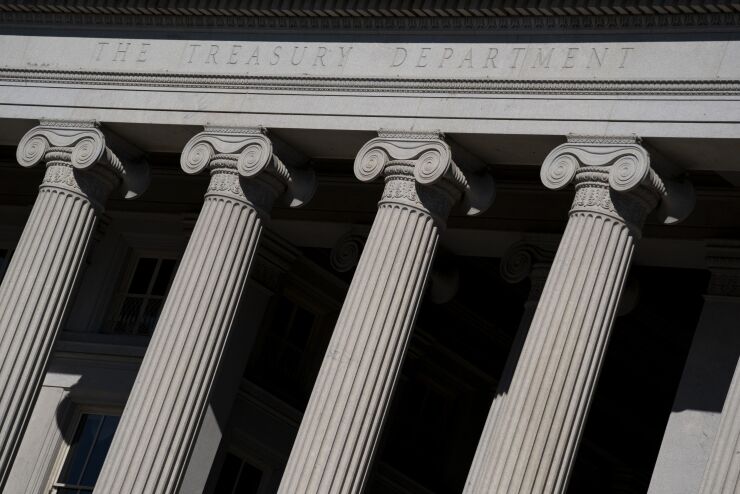
Investors were in a sour mood Wednesday after Fitch Ratings downgraded the U.S. government's credit rating, but analysts expect the firm's action to have little long-term impact on banks.
The markets didn't exactly shrug off the downgrade. The S&P 500 fell 1.38%, bank stocks came under pressure, and the benchmark 10-year Treasury yield rose to nearly 4.08%, up from the prior close of 4.05%, suggesting that demand for Treasurys declined slightly.
But the main point made by Fitch's action — that the U.S. political system is messier than it used to be — is one that analysts say has long been obvious to investors. Back in 2011, the rating firm Standard & Poor's downgraded U.S. sovereign debt. The debt ceiling had turned into a political football at that time, much as it did earlier this year.
Stock markets tumbled after the 2011 downgrade, but the impact of S&P's warning on financial markets was short-lived, noted Brian Gardner, chief Washington policy strategist at Stifel. After all, investors "come to their own conclusions and just don't blindly follow the rating agencies," he said.
The doomsday scenario after the 2011 downgrade was that investors would retreat from the U.S. Treasury market, which would prompt a spike in interest rates, since lending to the U.S. government would be seen as riskier.
Instead, markets quickly calmed down. Investor demand for what are seen for the world's safest bonds didn't wane, and interest rates stayed at historically low levels for years after 2011.
"I'm really skeptical that a new announcement by a rating agency is going to change investors' mindset on the current situation and have an impact on the bond market, on the yield curve and by extension on the banking industry," Gardner said.
By offering its gloomier take on the U.S. government, Fitch is "simply catching up with the view of investors," Ian Lyngen, a rates strategist at BMO Capital Markets, wrote in a note to clients.
"At this stage, it's old hat," Lyngen wrote.
Though the benchmark 10-year yield did rise a bit on Wednesday, Lyngen wrote that bond investors were focused on a technical announcement outlining the future mix of Treasury borrowing and perhaps a new private-sector jobs report from the employment firm ADP.
That report showed that private employers added 324,000 jobs last month, a solid result that could portend a strong jobs report when official U.S. data comes out Friday.
A hot job market could bolster the case for the Federal Reserve to raise interest rates again this year. Another rate hike, in turn, may exacerbate the pressure banks are seeing as their
"At the end of the day, unless there's really going to be a problem with Treasury paying the debt, banks should be able to manage through this without much impact to their business model," said Ed Groshans, a policy analyst at Compass Point Research & Trading.
"Let me say it a different way," he added. "Banks are going to be much more affected by another Fed rate hike than the Fitch downgrade."
JPMorgan Chase CEO Jamie Dimon was similarly skeptical that the Fitch action will have any significant impact, telling CNBC that the downgrade "doesn't really matter that much." Dimon, who has long called for Congress to scrap the debt ceiling, said Fitch pointed out issues "we all knew about."
The United States remains "the most prosperous nation on the planet," whose strong economy, military and innovation should make it "the highest-rated credit in the world." He pointed out that other countries whose AAA ratings remain intact "live under the American enterprise military system."
Those countries include Australia, Denmark, Germany and Luxembourg, according to the data firm
"To have them be AAA and not America is kind of ridiculous," Dimon said.
Fitch's downgrade cited the United States' "high and growing" debt burden and an erosion in governance "that has manifested in repeated debt limit standoffs and last-minute resolutions." But it also noted the country still has several structural strengths, including its decades-long status as the world's dominant reserve currency.
Decades of speculation that the U.S.'s reserve-currency status will come to an end some day have failed to bear fruit, Stifel's Gardner noted. The dollar still underpins most global trade, and U.S. Treasury securities remain a "safe haven" that investors flock to when markets come under stress, he added.
Treasury Secretary Janet Yellen pointed to the country's strengths in arguing that Fitch's decision was "entirely unwarranted."
"At the end of the day, Fitch's decision does not change what all of us already know: that Treasury securities remain the world's preeminent safe and liquid asset, and that the American economy is fundamentally strong," Yellen said in a speech.
By Wednesday afternoon, Fitch had not released any follow-up notes on U.S. bank ratings. But it said its action "will not trigger negative ratings actions" for U.S. non-financial corporations, and that AAA-rated life insurers will also not be affected.
The rating agency did downgrade the government-sponsored enterprises Fannie Mae and Freddie Mac, lowering them from AAA to AA+ to match the U.S. government's new rating.
Moody's Investors Service, the third major rating agency, has not downgraded the U.S. government.
The Kroll Bond Rating Agency, meanwhile, said Wednesday that it has "remained confident" in its AAA rating of the U.S. government despite the recent debt ceiling debate. That, KBRA said, is because of the country's fundamental credit strengths "despite the noise, headlines, and frequent bitterness of the government's political discourse."
"We believe that lowering the U.S. rating because of its current fiscal deficits or for its rancorous politics is ill-conceived," KBRA said in a statement, adding that another rating agency's "decision to hide behind comparative ratios to justify an arbitrary and subjective opinion does not serve markets well."





